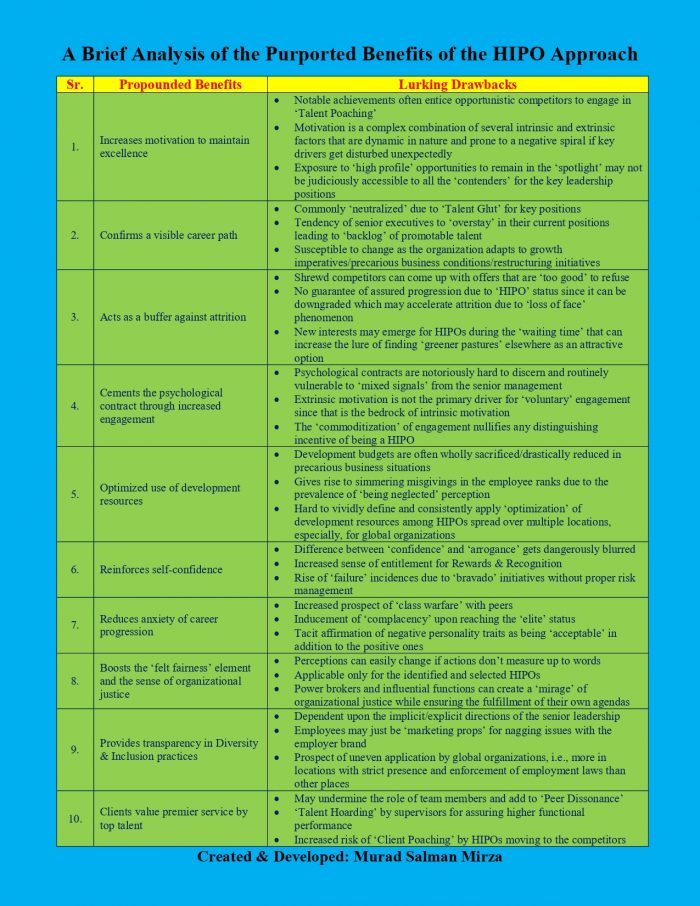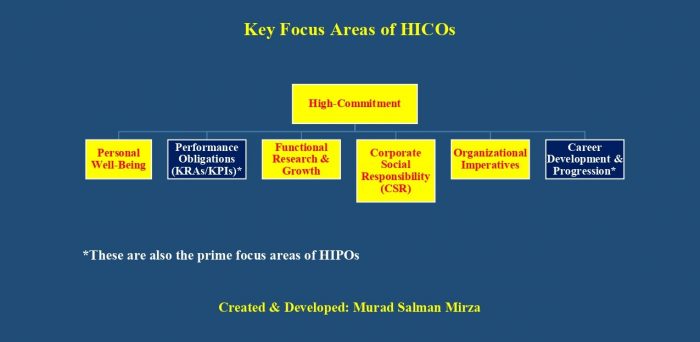High-Potential (HIPO) employees have been the mainstay of many Talent Management systems for a number of years within progressive organizations to bolster Succession Planning initiatives. Their ‘elevated’ status from the general workforce is often seen as an affirmation of the qualities needed to fill critical leadership positions in the organizational hierarchy. However, such ‘talent segmentation’ is quite often the source of deep misgivings within the peer population and is widely seen as a latent way of rewarding ‘conformist’ behaviors which hinder the ‘dissentient’ nature required to boost innovation for staying relevant in a Digital world. The term ‘Potential’ itself signifies a penchant for risk, gamble and uncertainty on predominantly ‘lagging’ performance indicators. It also projects a more refined version of the dreaded ‘Normal Distribution Curve’, used to weed out the lowest performers within the talent pipelines, that has been frequently attributed to sapping the morale of diligent employees and incentivizing ‘cannibalization’ of ‘Peer Careers’ to secure sanctuaries in the ‘safer’ zones of the respective talent mapping technique. Such divisive measures inevitably create negative energy within a workplace that is manifested in a number of ways, e.g., abrasive friction among peers, profound distrust of leaders, ‘faked’ engagement in organizational initiatives, hyperactive grapevine in corporate corridors, corrosive politics seamed within the organizational fabric, escalating attrition among disillusioned employees, damaged psychological contracts reflecting crumbling aspirations, marginalization of ‘inspiration’ triggers, etc.
Proponents of the HIPO approach are quick to point out several advantages that have ensured its place within the Talent Management initiatives. Let’s do a brief analysis of the more common attributes propagated in the defense of having HIPO programs, as follows:

The aforementioned analysis clearly shows that the HIPO approach, despite its ‘trumpeted’ advantages, is profoundly inadequate to galvanize an effective Talent Management System for the Digital world. Consequently, the term ‘HICO (High-Commitment)’ is proposed that is primarily premised on ‘genuine’ commitment being the prime driver of all intentions and actions of a conscientious professional who is routinely tasked to overcome difficult challenges in a precarious work environment. It focuses on all the key features that are crucial to an individual’s ability to effectively utilize his/her talent in the most beneficial way while providing ‘wholesome’ enrichment in the respective context. It goes beyond the assigned role(s) and incorporates other key factors with a significant influence on work and inculcates their influence in formulating a suitable portfolio of a strong succession candidate to core leadership positions. A visual depiction of its profound reach can be appreciated as follows:

Let’s take a brief look at the six key focus areas of HICOs, as follows:
Personal Well-Being
This refers to being highly devoted to all aspects of one’s own well-being while pursuing professional goals and objectives. Quite often, highly talented people tend to marginalize health concerns, hobbies & interests, family & friends, old contacts & acquaintances, etc., as they focus on career aspirations by embracing stressful conditions and trying to impress influential sources of power with their professional abilities. However, such ‘transient’ bonds cannot substitute the time-tested relationships that are generally needed in precarious situations to provide strong and reliable support for a balanced approach to life and profound self-reflection to recalibrate priorities in accordance with the ‘true’ passions.
Performance Obligations (KRAs/KPIs)
This reflects high emphasis on achieving excellence in the fulfillment of job responsibilities by consistently meeting/exceeding the defined Key Result Areas (KRAs)/Key Performance Indicators (KPIs). An enviable record in the respective context is generally used as a barometer for assessing an employee’s suitability as a potential successor to key leadership positions. This HICO aspect is shared with HIPOs, who covet its ‘magnetism’ in building a convincing case for their steady career progression up the corporate ladder. However, KRAs/KPIs are predominantly ‘lagging’ indicators of success and not a reflection of how a person might do as a leader, e.g., prominent doctors/renowned academicians/accomplished engineers/technical wizards don’t necessarily make great leaders.
Functional Research & Growth
This refers to being highly keen on advancing the field of professional interest. It includes active participation in peer forums/conferences/seminars, research projects and contributing articles on innovative viewpoints/techniques/approaches to facilitate the progressive development of the adopted discipline. This enables cross-fertilization of ideas and strengthens the innovative mindset to overcome multivariate challenges in the workplace. It also liberates the thought processes in envisioning novel ways of adapting to the dynamic demands of the Digital world. Additionally, it helps to engage in an honest self-assessment of professional prowess that often gets masked by the ‘narrow’ demands of working in a particular organization.
Corporate Social Responsibility (CSR)
This entails possessing high level of ardor for actively participating in the initiatives pertaining to an organization’s promise on being a punctilious member of society. It requires a penchant for service that goes beyond the professional demands of the assigned function and opens horizons for permeation of altruistic thought and meaningful contributions to the wider goal of ensuring a harmonious existence within the global community. Such engagement prepares ‘potential’ leaders to be mindful of the ‘citizenry’ aspect of the organization, which is essential for taking proactive actions in mitigating/eliminating the chance of a misstep that might jeopardize the organization’s future in an increasingly ‘sensitized’ and ‘connected’ world.
Organizational Imperatives
This refers to being highly dedicated to the strategic priorities of the organization. It calls for alignment of personal goals with the overall organizational objectives. Such congruence requires unflinching determination to ensure organizational success in a cohesive culture based upon ‘progressive’ and ‘robust’ shared values. It demands profound understanding of the key organizational challenges and unwavering confidence in the senior leadership to steer the organization in the desired direction. It is facilitated by providing the ‘temporary’ benefit of loosening the ‘stringent’ expectations of the ‘psychological contract’ with the condition that the element of trustworthiness will not be egregiously violated by the top executives.
Career Development & Progression
This alludes to being highly geared towards gaining a clear understanding of the available career path and engaging in appropriate activities/approaches that ensure a steady rise through the corporate ranks. It includes timely realization of the changing landscape within the chosen professional discipline and getting the necessary training and development coupled with relevant professional experience and pertinent academic credentials to present a strong candidature for progression. It also recognizes the need for astute networking and ‘jostling’ for exposure in front of key decision-makers, who play a significant role in succession planning for critical leadership positions. An important determinant for recognition in the respective context is the firm grasp of skills that foster innovation which has become the hallmark of the Digital world. This HICO aspect is also shared with HIPOs, who generally consider and expect it as an integral element of Reward and Recognition, in addition to conventional compensation, for notable achievements.
CONCLUSION
HIPO employees have become a divisive status symbol and attractive poaching targets for ravenous competitors which has complicated the Organizational Development issues within business entities trying to thrive in a Digital world. HICO provides considerable relief in the respective context by providing a more ‘wholesome’, ‘inclusive’ and ‘risk-mitigated’ application of a ‘truly effective’ Talent Management System. However, it remains to be seen whether progressive organizations can extricate themselves from the complacency of continuing with ‘herd-mentality’ practices or will they muster the courage to adopt a more concrete way to assure a healthy stock of ‘capable’ and ‘reliable’ succession candidates for key leadership vacancies in the future. I am betting that High-Commitment (HICO) will always trump High-Potential (HIPO)…








